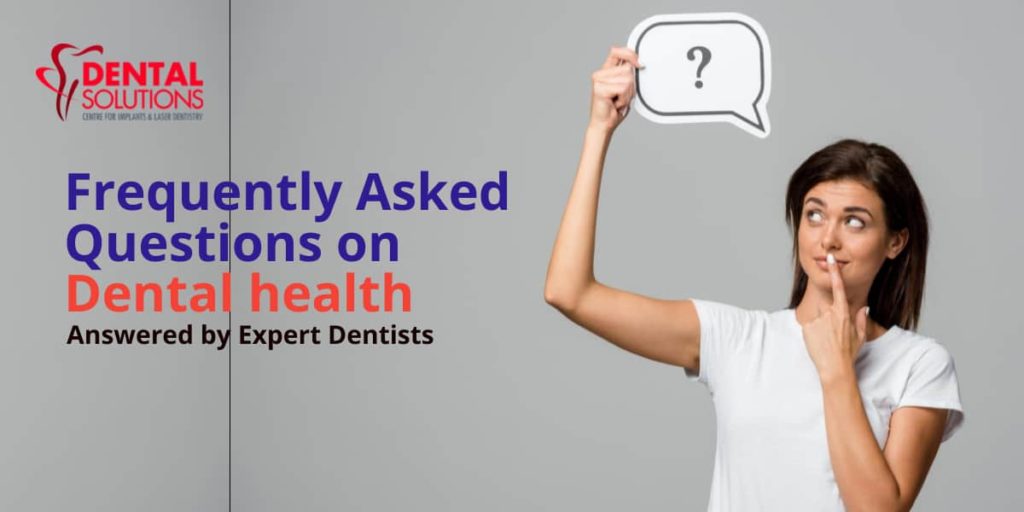- +917892951808
- Indiranagar, Bangalore
Best Dental Clinic In Bangalore Indiranagar | Best Dentist in Bangalore Indiranagar
- Home
- About Us
- Treatments
- Blog
- Contact Us
8 FAQ About Dental Health – Answered by dentists

Every day we meet several people who visit our clinic for dental treatments – root canal treatment, dental implants, dentures, braces, full mouth rehabilitation, dental check-up and more.
The one thing that is common among all these people is that they have a lot of questions – a lot of questions related to the dental world. There are some questions that are more frequently asked than others. Hence, we decided to put them all together for the benefit of all.
Here is a list of frequently asked questions about dental health
1. Are dental X-rays safe?
Dental X-ray exams are safe; however, they do require very low levels of radiation exposure, which makes the risk of potentially harmful effects extremely small.
X-rays are required to diagnose a medical condition. Unless absolutely necessary, no dentist will ask for an X-ray. Today's digital X-rays release much less radiation and are safer than in the past. If you are pregnant, make sure to keep your dental professional informed.
X-rays are required to diagnose a medical condition. Unless absolutely necessary, no dentist will ask for an X-ray. Today's digital X-rays release much less radiation and are safer than in the past. If you are pregnant, make sure to keep your dental professional informed.
2. Why are my gums bleeding?
Gums bleed when they are irritated and inflamed and bleeding gums is the most common sign of gum disease.
Some other reasons why your gums could be bleeding are:
1. Brushing too vigorously
2. Using a toothbrush that has hard bristles.
3. Dentures or retainers which are not fitted properly.
4. Bacterial infection in the tooth or gums.
5. Hereditary.
6. Use of blood-thinning medicines
7. Smoking irritates gums and leads to bleeding gums.
8. Sometimes pregnancy could also be the cause of bleeding gums
Do not neglect bleeding gums problems, contact your dental professional at the earliest to avoid the development of advanced forms of gum disease. Treat bleeding gums immediately.
Some other reasons why your gums could be bleeding are:
1. Brushing too vigorously
2. Using a toothbrush that has hard bristles.
3. Dentures or retainers which are not fitted properly.
4. Bacterial infection in the tooth or gums.
5. Hereditary.
6. Use of blood-thinning medicines
7. Smoking irritates gums and leads to bleeding gums.
8. Sometimes pregnancy could also be the cause of bleeding gums
Do not neglect bleeding gums problems, contact your dental professional at the earliest to avoid the development of advanced forms of gum disease. Treat bleeding gums immediately.
3. Why does my mouth always feel dry?
When our mouth does not produce enough saliva, we experience dry mouth. Saliva is very important to keep the mouth wet and moist. Saliva is very important as it protects our mouth from gum disease and tooth decay.
Reasons for a dry mouth could be – Side effects of Medication, dehydration, ageing, Breathing through the mouth and pregnancy.
To avoid dry mouth syndrome, stay hydrated, maintain good oral hygiene, use a mouthwash, avoid alcohol and smoking, and consult a dentist for more help – They may recommend one of the many products that are available over-the-counter to help to alleviate this problem.
Reasons for a dry mouth could be – Side effects of Medication, dehydration, ageing, Breathing through the mouth and pregnancy.
To avoid dry mouth syndrome, stay hydrated, maintain good oral hygiene, use a mouthwash, avoid alcohol and smoking, and consult a dentist for more help – They may recommend one of the many products that are available over-the-counter to help to alleviate this problem.
4. What do Dental sealants do?
Sealants protect against cavities that can form in the natural tiny holes and cracks on the outside of teeth.
Dental sealants use plastic coatings on the surface of the permanent back teeth to protect them from decay. The coating blocks the tooth from plaque, debris that causes cavities.
Read more: All you need to know about Dental Sealants
Dental sealants use plastic coatings on the surface of the permanent back teeth to protect them from decay. The coating blocks the tooth from plaque, debris that causes cavities.
Read more: All you need to know about Dental Sealants
5. What's the best way to whiten my teeth?
There are 2 options
1. Home Tooth Whitening Solutions
Also known as over the counter method. This option is comparatively inexpensive and easy to use. Although there are commercially available tooth whitening products, only a few can be purchased without a dentist's supervision – E.g. Mouth trays with gel, whitening strips, whitening toothpaste, paint-on tooth gel.
If you have major oral health concerns, it is best to talk to your dentist and use these products.
2. Professional Teeth Whitening
Professional teeth whitening is also known as chairside bleaching. This method remains the most effective and highly preferred form of teeth whitening. The whitening products contain one of the two tooth bleaches – hydrogen peroxide or carbamide peroxide – to give you the bright white-teeth you want.
Read: How to get rid of yellow teeth professionally?
1. Home Tooth Whitening Solutions
Also known as over the counter method. This option is comparatively inexpensive and easy to use. Although there are commercially available tooth whitening products, only a few can be purchased without a dentist's supervision – E.g. Mouth trays with gel, whitening strips, whitening toothpaste, paint-on tooth gel.
If you have major oral health concerns, it is best to talk to your dentist and use these products.
2. Professional Teeth Whitening
Professional teeth whitening is also known as chairside bleaching. This method remains the most effective and highly preferred form of teeth whitening. The whitening products contain one of the two tooth bleaches – hydrogen peroxide or carbamide peroxide – to give you the bright white-teeth you want.
Read: How to get rid of yellow teeth professionally?
6. Why do dentists advise fluoride treatment, do teeth really need fluoride?
Fluoride helps make teeth strong and prevents decay. It is present in toothpaste and tap water and is one of the easiest and cost-effective ways of keeping decay at Bay.
7. Do I really need to floss?
One word answer – Yes! There's no getting away from flossing if good oral health is what you need. It clears food and plaque from between teeth and under the gumline. If you don't, plaque hardens into tartar, which can cause several dental problems.
If you do not prefer thread flossing, try water flossing.
Read: Is Water Flossing an alternative to traditional flossing?
If you do not prefer thread flossing, try water flossing.
Read: Is Water Flossing an alternative to traditional flossing?
8. I have sensitive teeth. What can I do?
You can try using toothpaste specifically designed for sensitive teeth. Rub a little toothpaste into the sensitive area when going to bed as it helps protect the surface.
Avoid acidic foods and drinks. Grinding your teeth can also increase sensitivity and a mouthguard can help.
Speak to your dentist if the pain is critical.
Avoid acidic foods and drinks. Grinding your teeth can also increase sensitivity and a mouthguard can help.
Speak to your dentist if the pain is critical.
Do you have any questions related to your dental health? You can drop it in the comments below or contact us.
